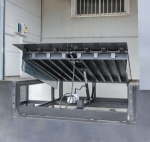If you've ever had a loading dock door jam during peak hours or a leveler break down mid-shipment, you know how quickly things can go sideways. In a fast-moving warehouse or distribution center, response time can make or break your day. That's why it's crucial to understand how service providers handle urgency and what kind of guarantees they put in writing—also known as service level agreements (SLAs).
Let's dig into how Loading Dock Services in Miramar and beyond manage different levels of urgency, and what you should expect from a reliable dock service provider.
Why Fast Response Time Matters
Your loading dock is the nerve center of your operation. If one part of it fails—a dock leveler, door, restraint, or ramp—you've got delays, safety issues, and possibly a pile-up of trucks waiting to be loaded. Every minute counts.
Delays don't just cost money. They can also lead to:
- Missed shipments
- Backlogged inventory
- Damaged relationships with carriers and clients
- Safety hazards for your team
That's why service response time isn't just a number—it's a business-critical factor.
Understanding Urgency Levels
Most service providers break down response priorities into tiers based on how severe the problem is. Here's how they usually categorize service calls:
- Emergency/Urgent (Same-Day or 2–4 Hours)
This is for serious issues that shut down operations—like a broken door stuck halfway open or a failed leveler that makes the bay unusable.
You can expect top priority here, often with technicians dispatched within hours. For businesses relying on Loading Dock Services in Miramar, this kind of emergency support is a lifesaver during time-sensitive shipments.
- High Priority (Next-Day)
These are important issues that don't completely shut things down but still pose a risk or cause inefficiencies. Maybe a hydraulic lift is acting up, or a door sensor isn't working correctly.
You'll usually get service within 24 hours. It's still fast—but not quite a fire drill.
- Standard or Scheduled Service (1–3 Days or Longer)
This covers general maintenance, minor wear-and-tear fixes, or upgrades that aren't urgent. It's still important, but it won't stop you from loading and unloading.
Most service providers will work with your schedule here, offering appointments within a few business days.
What Is a Service Level Agreement (SLA)?
An SLA is a contract between you and your service provider that defines the expected performance standards—especially response times. It takes the guesswork out of what's covered and when.
Here's what a good SLA should include:
- Response time guarantees by urgency level
- Availability window (24/7 support or business hours only)
- Repair or resolution timelines
- Communication expectations (updates, technician arrival notices)
- Penalties or credits if service levels aren't met
If you rely on Loading Dock Services in Miramar, having an SLA in place ensures you're not left hanging when something breaks down.
Key Factors That Affect Response Time
Not all delays are created equal, and sometimes response time depends on a few things out of your control. Here are a few factors that impact how quickly service teams can show up:
- Location – Facilities closer to the service provider's base get faster response. If you're in Miramar, you're in luck—local dock service companies usually cover this area quickly.
- Time of day – Emergency calls during business hours are easier to handle than middle-of-the-night issues, unless your SLA includes 24/7 support.
- Parts availability – Some fixes require special components that might not be on the truck. If your provider stocks common parts locally, you'll get quicker repairs.
- Scope of the problem – A quick sensor swap is faster than a full hydraulic rebuild. The bigger the fix, the longer it might take.
The best service providers are transparent about these variables and will give you honest timelines upfront.
How to Prepare Before You Need Help
You don't want to wait for something to break before thinking about response times. Here's how to set yourself up for success:
- Schedule routine inspections – Preventive maintenance helps avoid surprise breakdowns.
- Keep a maintenance log – Track service history so technicians know what they're walking into.
- Review your SLA annually – Make sure it still meets your facility's needs.
- Build a relationship with a local team – If you regularly use Loading Dock Services in Miramar, stick with a provider who knows your layout, your equipment, and your urgency.
What You Should Expect From a Top-Tier Service Team
Not all dock service companies are built the same. Here's what separates the pros from the rest:
- Clear communication – They tell you when they're arriving and what they'll be fixing.
- Upfront estimates – No surprise charges after the job is done.
- Skilled technicians – Trained and certified, with real-world experience.
- Well-stocked trucks – So they're ready to fix it on the first visit.
- Follow-up service – They don't just fix it and forget it. They check in afterward to make sure things are working.
Final Thoughts
Your loading dock doesn't operate on its own—and neither should your service plan. Fast response times, clear urgency levels, and reliable SLAs are the backbone of a smooth-running warehouse. Whether you're handling dozens of trailers a day or just a few, knowing your service team has your back makes all the difference.
If you're working with Loading Dock Services in Miramar, choose a provider that offers clear timelines, honest communication, and experienced techs who show up ready to work. Because in the world of logistics, time really is money—and a well-timed repair can keep your whole operation rolling.






